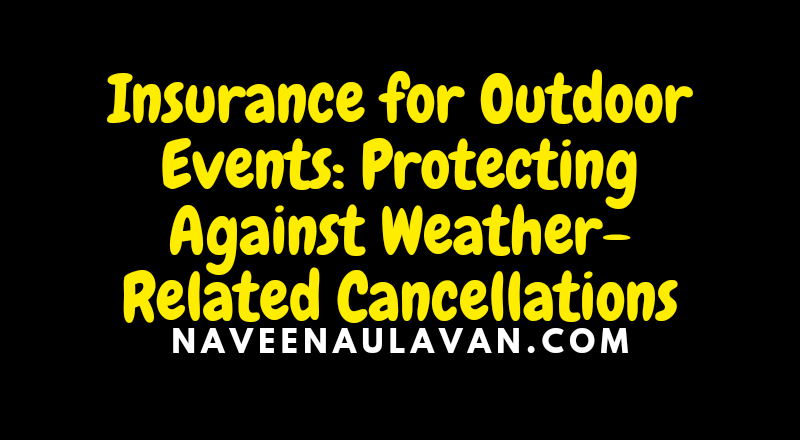Outdoor events have grown in popularity over the years, providing unique experiences and entertainment options for attendees. However, these events are often at the mercy of unpredictable weather conditions, which can lead to cancellations and financial losses for organizers. To mitigate this risk, insurance coverage specifically tailored for outdoor events has become an essential aspect of event planning. In this article, we will explore the importance of insurance for outdoor events and the different types of coverage available.
The Impact of Weather-Related Cancellations
Weather-related cancellations can have a significant impact on the success and profitability of outdoor events. Severe weather conditions such as heavy rain, thunderstorms, hurricanes, or extreme heat can create unsafe and unpleasant conditions for attendees, leading organizers to make the difficult decision to cancel or postpone the event. These cancellations not only disappoint attendees but also result in financial losses for event organizers who have invested significant time, effort, and resources in planning and organizing the event.
Financial Consequences
When an outdoor event is canceled due to adverse weather conditions, the financial consequences can be severe. Organizers may have already incurred expenses related to venue rental, permits, equipment rentals, advertising, and staff payments. Additionally, they may have invested in non-refundable deposits for performers, vendors, and suppliers. Without insurance coverage, these costs are essentially lost, creating a substantial financial burden for the event organizer.
Reputation and Image
Cancellation of an outdoor event due to inclement weather can also harm the reputation and image of the event organizer. Attendees who had planned to attend the event may be frustrated, disappointed, and may lose trust in the organizer’s ability to deliver on future events. Negative word-of-mouth and online reviews can further damage the organizer’s credibility and make it harder to attract attendees to future events.
Types of Insurance Coverage
To protect against weather-related cancellations and mitigate the associated financial risks, event organizers can obtain specialized insurance coverage catered specifically for outdoor events. There are several types of insurance coverage available, each offering unique benefits and protection. Let’s explore some of the most common types:
Event Cancellation Insurance
Event cancellation insurance provides coverage for financial losses resulting from the cancellation, abandonment, or postponement of an event due to unforeseen circumstances, including adverse weather conditions. This insurance typically covers expenses such as venue rental fees, non-refundable deposits, advertising costs, performer fees, and other necessary and unavoidable expenses incurred in organizing the event.
Adverse Weather Insurance
Adverse weather insurance focuses specifically on protecting against financial losses caused by adverse weather conditions. This coverage is especially relevant for outdoor events that are highly susceptible to weather-related cancellations. In the event of a cancellation due to adverse weather, this insurance would reimburse the insured for covered expenses related to the event.
Force Majeure Insurance
Force majeure insurance provides coverage for disruptions or cancellations that occur due to unforeseen circumstances beyond the control of the event organizer. While adverse weather conditions are often included in this type of coverage, it can also protect against other events such as strikes, terrorism, or natural disasters. Force majeure insurance ensures that event organizers are protected against financial losses resulting from events that are considered unavoidable and beyond their control.
Factors to Consider When Choosing Insurance
When selecting insurance coverage for an outdoor event, there are several key factors that organizers should consider:
Event Type and Location
The type of event and its location will have a significant impact on the level of coverage required. Different events may have specific risks and challenges associated with them, and the location can influence the likelihood and severity of weather-related cancellations. Organizers should carefully evaluate their specific event and its location to determine the most suitable coverage.
Insurance Provider Reputation and Expertise
It is crucial to choose an insurance provider with a strong reputation and expertise in providing coverage for outdoor events. The insurance company should have experience in the industry and demonstrated knowledge of the unique risks and challenges faced by event organizers. Researching and comparing several insurance providers can help organizers find the best fit for their specific needs.
Policy Terms and Coverage Limits
Organizers should carefully review the terms, conditions, and exclusions of the insurance policy before making a final decision. Understanding the coverage limits, deductibles, and any additional requirements is essential to ensure that the policy adequately protects against financial losses.
Conclusion
Outdoor events are susceptible to unexpected weather conditions, which can lead to cancellations and financial losses for event organizers. Obtaining insurance coverage specifically tailored for outdoor events is crucial to protect against these risks and mitigate the negative impact of weather-related cancellations. Event cancellation insurance, adverse weather insurance, and force majeure insurance are some of the common types of coverage available to protect against financial losses.
When selecting insurance coverage for an outdoor event, organizers should consider factors such as the event type and location, the reputation and expertise of the insurance provider, and the terms and coverage limits of the policy. Careful evaluation and comparison of different insurance options can ensure that organizers choose the most appropriate coverage for their specific needs.
In conclusion, insurance for outdoor events is essential to protect against weather-related cancellations and the financial consequences that can arise from them. By obtaining specialized coverage, event organizers can safeguard their investments, mitigate potential losses, and maintain their reputation and credibility with attendees. Planning and organizing an outdoor event requires careful consideration of potential risks, and insurance coverage is a vital tool in managing these risks successfully.
